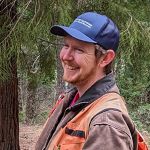Embracing the Environmental Principles and Concepts
By Austin Roughton, CASE Environmental Literacy Committee
A Blueprint for Environmental Literacy: Educating Every Student In, About, and For the Environment (2015) calls for California educators to help students develop their environmental literacy through “lived experiences and education programs that include classroom-based lessons, experiential education, and outdoor learning.”
The CASE Environmental Literacy Committee supports these efforts by bringing together formal and non-formal educators to create unique in-person and online learning opportunities for teachers statewide.
This November at the CASE California Science Education Conference in Sacramento, committee members led several workshops focused on empowering educators to cultivate environmental literacy in themselves and their students. Workshops saw participants using tools like iNaturalist and nature journals in Sacramento’s Capitol Park to observe their surroundings and connect with the state capital’s environment. These workshops all leaned into the power of getting curious about your surroundings; you don’t need to go far to discover engaging everyday phenomena that spark observation, inquiry and investigation.
Presenters also encouraged participants to view their teaching practice through the lenses of California’s Environmental Principles and Concepts (EP&Cs), guidelines developed to inform all standards-based instruction in support of environmental literacy. Importantly, the EP&Cs highlight the interdependence of humans and natural systems, forming an interdisciplinary web of connections that all educators can leverage to promote student inquiry. To further this work, the Environmental Literacy Committee is offer an online workshop focused on the EP&Cs on April 2, 2025. Registration is now open.

About the Author
Austin Roughton serves as the Forestry Youth Education Coordinator for the University of California Cooperative Extension, and is a member of the CASE Environmental Literacy Committee. He designs professional learning experiences for educators statewide, and supports efforts to educate youth about forestry and natural resource management in California.






